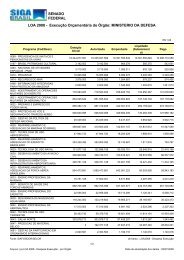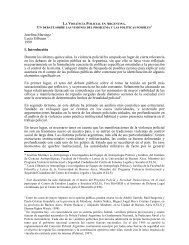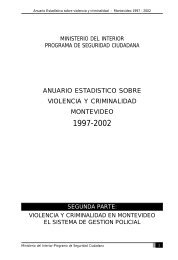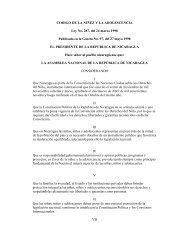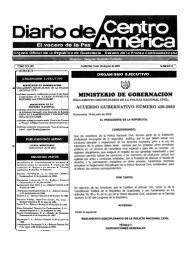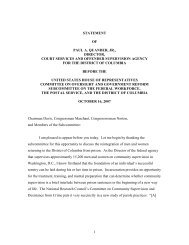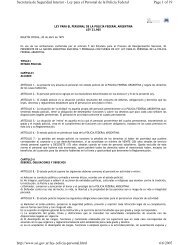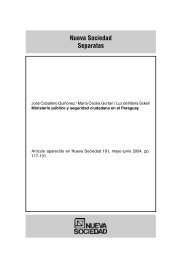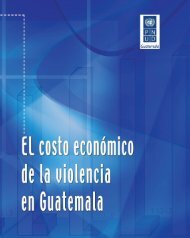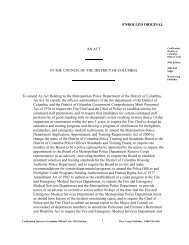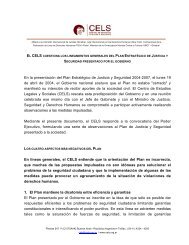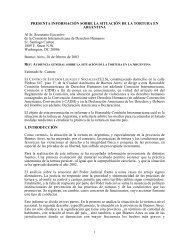Venezuela: The Life and Times of the Party System - Political ...
Venezuela: The Life and Times of the Party System - Political ...
Venezuela: The Life and Times of the Party System - Political ...
You also want an ePaper? Increase the reach of your titles
YUMPU automatically turns print PDFs into web optimized ePapers that Google loves.
number <strong>of</strong> voters, <strong>the</strong> electoral system has functioned as an effective channel to incorporate <strong>the</strong><br />
general population as well as more organized sectors into <strong>the</strong> political arena.<br />
On <strong>the</strong> o<strong>the</strong>r h<strong>and</strong>, <strong>the</strong> electoral system in force through most <strong>of</strong> <strong>the</strong> democratic period<br />
creates or reinforces certain problems in <strong>the</strong> political system. <strong>The</strong> effect <strong>of</strong> <strong>the</strong> closed list system<br />
in concentrating c<strong>and</strong>idate selection <strong>and</strong> overall decision-making authority in <strong>the</strong> h<strong>and</strong>s <strong>of</strong><br />
national party directorates reduces citizen control over <strong>the</strong> internal dynamics <strong>of</strong> <strong>the</strong> parties <strong>and</strong><br />
over <strong>the</strong> performance <strong>of</strong> elected <strong>of</strong>ficials. <strong>The</strong> dem<strong>and</strong>s <strong>of</strong> party discipline fur<strong>the</strong>r limit <strong>the</strong><br />
responsiveness <strong>of</strong> elected <strong>of</strong>ficials to popular dem<strong>and</strong>s. <strong>The</strong> high cost <strong>of</strong> campaigning also<br />
creates financial barriers to <strong>the</strong> participation <strong>of</strong> political groups with fewer resources. As a result,<br />
<strong>the</strong> system does not guarantee political or electoral ‘fair play’ <strong>and</strong> facilitates <strong>the</strong> oligopolization <strong>of</strong><br />
<strong>the</strong> political game (see Rey 1989b).<br />
Universal suffrage <strong>and</strong> m<strong>and</strong>atory voting have been fundamental principles <strong>of</strong><br />
<strong>Venezuela</strong>n democracy. In <strong>Venezuela</strong>, <strong>the</strong> act <strong>of</strong> voting has been viewed as a fundamental civic<br />
duty, not simply a right (see Rey 1989c). After 1958, voting was fur<strong>the</strong>r viewed as an “expression<br />
<strong>of</strong> an emotional commitment <strong>of</strong> adherence to democracy,” <strong>and</strong> <strong>the</strong> first elections were considered<br />
to be “plebiscites in favor <strong>of</strong> democracy” (Rey 1989c, 21). 1 Failure to vote was viewed as a<br />
crime deserving punishment.<br />
<strong>The</strong> 1961 constitution established a system that has been relatively successful at<br />
combining presidentialism, based on a simple majority principle, with proportional representation<br />
at <strong>the</strong> legislative level. 2 Elections for senators <strong>and</strong> deputies are governed by <strong>the</strong> principle <strong>of</strong><br />
proportional representation. <strong>The</strong> liberal nature <strong>of</strong> <strong>the</strong> proportional representation system as well<br />
as <strong>the</strong> low barriers established for <strong>the</strong> creation <strong>of</strong> new parties have been effective sources <strong>of</strong><br />
incorporation <strong>and</strong> legitimacy for <strong>the</strong> democratic system. 3 Prior to <strong>the</strong> adoption <strong>of</strong> <strong>the</strong> Second<br />
Constitutional Amendment, which took effect in 1983, this principle was applied in municipal<br />
1 <strong>The</strong> Pact <strong>of</strong> Punto Fijo reads as follows: “All votes bestowed on <strong>the</strong> democratic c<strong>and</strong>idacies<br />
will be considered as one, <strong>and</strong> <strong>the</strong> sum <strong>of</strong> votes for <strong>the</strong> competing colors [parties] as an<br />
affirmation <strong>of</strong> <strong>the</strong> people’s support for <strong>the</strong> constitutional regime <strong>and</strong> <strong>the</strong> consolidation <strong>of</strong> <strong>the</strong> rule <strong>of</strong><br />
law.”<br />
2 Recent studies on <strong>the</strong> impact <strong>of</strong> institutional factors on <strong>the</strong> establishment, consolidation, <strong>and</strong><br />
maintenance <strong>of</strong> democracy have called attention to <strong>the</strong> different effects <strong>of</strong> presidentialism <strong>and</strong><br />
parliamentarism on regime stability. See Linz (1990) <strong>and</strong> Mainwaring (1990). It has also been<br />
argued that <strong>the</strong> combination <strong>of</strong> presidentialism <strong>and</strong> proportional representation creates instability<br />
<strong>and</strong> crises <strong>of</strong> governability. <strong>Venezuela</strong> is an exception to both arguments, due in general terms to<br />
<strong>the</strong> hegemony <strong>of</strong> AD <strong>and</strong> COPEI: that is, to party discipline, de facto two-party politics, <strong>and</strong> <strong>the</strong><br />
nonpolarized nature <strong>of</strong> ideological debate, as well as to efforts made to reach accords <strong>and</strong> parainstitutional<br />
pacts that complement strictly electoral mechanisms <strong>and</strong> results.<br />
3 <strong>The</strong> electoral system is so liberal that it has allowed groups winning less than 1 percent <strong>of</strong><br />
<strong>the</strong> vote in <strong>the</strong>ir districts to win seats in <strong>the</strong> Chamber <strong>of</strong> Deputies. To register state-level parties it<br />
is necessary to present a roster <strong>of</strong> members equivalent to no less than 0.5 percent <strong>of</strong> <strong>the</strong> total <strong>of</strong><br />
registered voters in <strong>the</strong> specific district. If a party registers in at least 12 states, it is automatically<br />
constituted as a national party. Also, any group <strong>of</strong> voters that obtained at least 3 percent <strong>of</strong> <strong>the</strong><br />
vote in <strong>the</strong> previous state or national elections can legally become a party [Ley de Partidos<br />
Políticos, Reuniones Públicas y Manifestaciones, articles 10, 16, 17].



